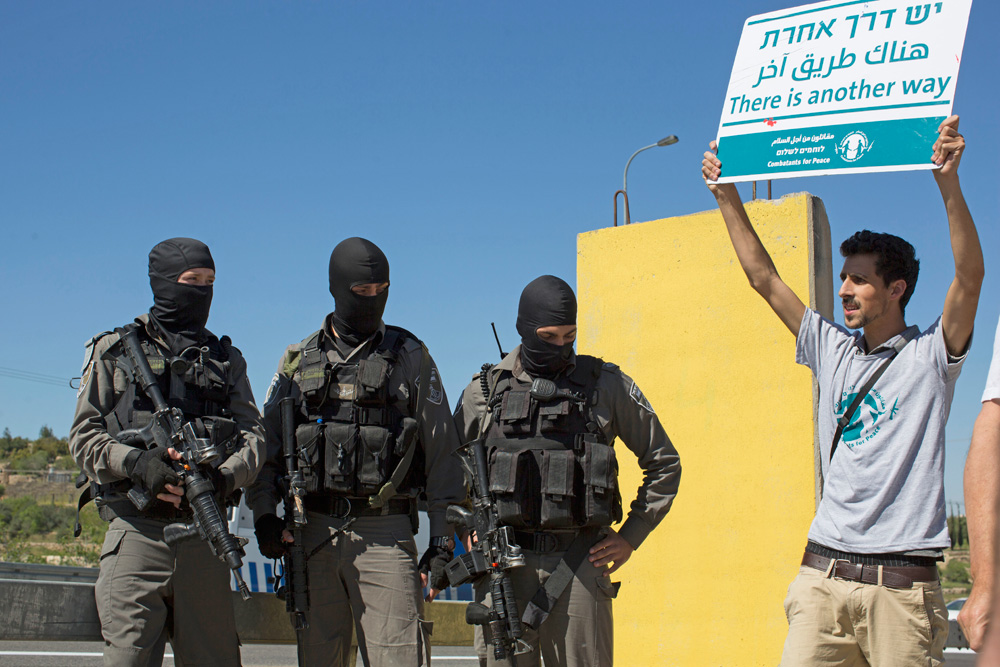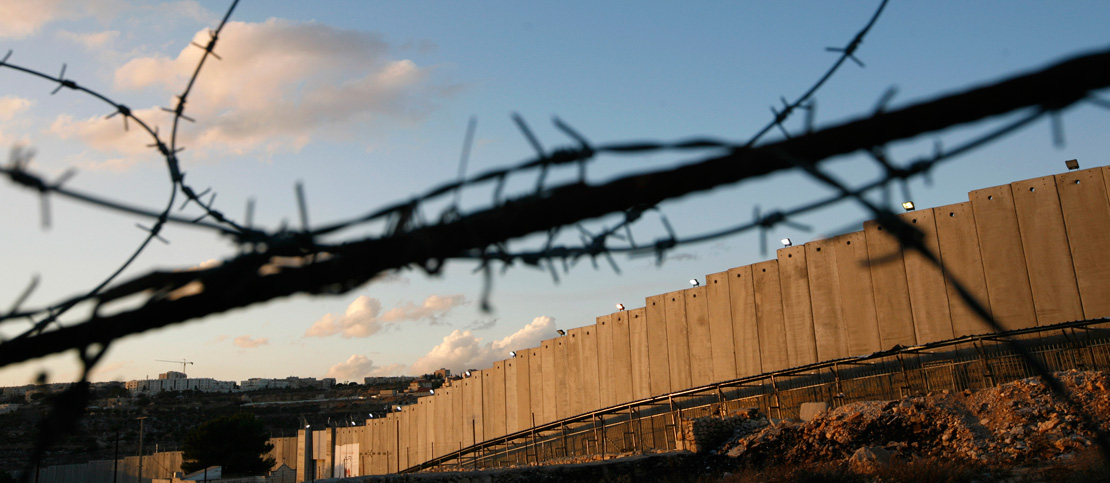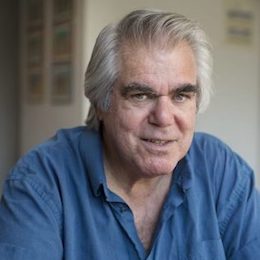“No Country for Jewish Liberals,” by Larry Derfner, Just World Books, 260 pp., $26.95
Moving to Israel was an experiment of sorts for Larry Derfner. As a journalist, it was an attempt to advance his career. More significantly, at least with the benefit of hindsight, it was an attempt to reconcile the intoxicating appeal of muscular nationalism with the liberal values he absorbed in his Los Angeles home and by coming of age in the Vietnam-era anti-war movement.
It was easier to be liberal in the United States because the real-world consequences of dovish policies rarely put you at personal risk, Derfner tells me in a broad-ranging conversation about his recent book, No Country for Jewish Liberals. “You want to be a liberal here? You better get a better idea of what’s at stake. I wanted to test my ideals against reality. That’s what I thought Israel was.”
Derfner is best known as a columnist and opinion writer, for The Jerusalem Post, for several years at +972 Magazine, and currently with Haaretz. The book itself also feels like a journalistic experiment at times: a director’s cut of his decades-long body of work. But mostly, it is an accounting of his personal political transformation, and through it, the story of Israel over the past three decades and the many deep-seated contradictions it comprises.
When Larry Derfner first started writing for +972 Magazine, one of the first major public discussions in which he took part centered on the question of whether Liberal Zionism poses an inherent contradiction. Looking back on that debate today, it is clear that Larry has always been uncompromising in his assessment of the world but is also willing to accept certain contradictions — and even some injustices — as unmovable foundations of reality. That often leaves him uncomfortably wedged between the uncompromising nature of the radical left and the mainstream’s unwillingness to look reality in the eyes.
Nevertheless, many of his views have continued to progress over the years.
In that +972 Magazine debate back in 2011, Derfner had already come to acknowledge that, “Zionism privileges the Jews over Arabs and other gentiles, and that’s at odds with liberal values.” However, he continued, “if Israel stops being a Jewish state it will become a Palestinian state, and on the way to that it will be a state at civil war that will bring on the exodus of the Jews – and that’s even more at odds with my liberal values than Zionism.”
When we sat down to discuss his new book a few weeks ago, I decided to start there, checking back in about his thoughts on that same topic.
Is there such a thing as Liberal Zionism? Can liberalism and nationalism be reconciled in Israel?
“There could be. If we got out of the West Bank and Gaza I think we could have a Jewish majority state that would be a great country, where we’re not ruling anybody’s life, where we’re not attacking countries because they look at us funny, and we’re treating Israeli Arabs as [equals] … where they’re in the government.
“Personally, I’d like to see an integrated society. I’d like to see Jews living with Arabs and Jewish kids going to school with Arab kids. And treating refugees as refugees and not as pariahs. I think all that is possible, but it’s not happening and the chances are overwhelming that it won’t.”
Your political views would put you smack in the middle of the political map somewhere like the U.S. but in Israel they make you a radical. Do you resent being pushed into the political margins?
“It’s not that I resent it but it’s not my comfort zone. My comfort zone is where I was until about 2008, which is the right wing of Meretz and the left wing of Labor. As one guy said to me, ‘you’re a leftist but you’re a muscular leftist.’ I always loved that. The retired general who’s in favor of dividing the territory but who fought like a lion against terrorism and all that stuff. It sounds really good to me. I feel comfortable with that because personally, I’m not a radical. I live in the suburbs. I got a wife and two kids.
“But we’re in a situation where Israel is doing the kinds of things, more or less like they did in South Africa, like they did in the American South, and to be just a normal democrat puts you in a 180 degree opposition to that, which makes you a radical.”
The way that ‘muscular liberalism’ manifests itself in Israel is in a security discourse. Particularly with regards to the peace process, its motivations for ending the occupation are purely self-interested, expressed by security and demographic dominance. The question of morality, justness or empathy is simply not a part of the equation. You write:
“To those ‘liberals’ who care only about Israel’s practical self-interest, I suggest that they support Netanyahu. I would, if that’s all I was looking out for. He’s managing the conflict, so far at a very, very low price to Israeli Jews; why mess with success? Ending the occupation will be sheer hell for this country… If you’re concerned strictly for Israel’s practical self-interest, you don’t want that. You want Netanyahu.”
“I call myself a liberal Zionist because I believe Israel as a Jewish state is the only way that this place can survive; I don’t think a bi-national state can survive. Not because I need a Jewish state or we need a Jewish state — I don’t think we do, but it’s here. To try and to dismantle it would be disastrous. So given the options, I’d like to have a Jewish state and that technically makes me a Zionist. And because I want to get rid of the occupation and all that, that makes me a liberal Zionist.
“But when people on the Left hear liberal Zionist they think of Thomas Friedman and they think of Jeffrey Goldberg and these people who say ‘nu, nu, nu’ to Netanyahu but every time we start a war it’s ‘go get ’em.’ When people hear Liberal Zionism, or Liberal Zionist, they think of phony Liberal Zionists, and unfortunately, in most cases that’s true. But I think there is a Liberal Zionism that doesn’t have to be phony.”
Your book, in some ways, is like watching the director’s cut of your body of work — decades of opeds. You weave it all together, and talk a lot about the progression of how you got to where you are today. There’s a passage that stuck with me:
“The most discomforting but also vital experience in writing opeds, at least for me, comes from facing my fears. So often I’ll be writing a piece, or thinking about writing one, and I’ll become aware that there’s something I’m afraid to say, something I’m even afraid to think. Then I’ll dare to think that thought (because once you realize there’s something you’re afraid to think, you either have to think it or admit that you’re a coward).”
You write that your last major political transformation happened around 2008 with Cast Lead. Since then you have moved even further left, but at some point that movement ended. Does that represent a personal ‘end of history’ moment for you? Is there anything you’re still afraid to say?
 “The last idea I’ve come to accept, which was hard to accept, is that from the beginning, as Ari Shavit writes, the logic of Zionism was always expulsion — mass expulsion. Very simply, you can’t build a Jewish state in a land that’s overwhelmingly Palestinian. Sooner or later that means either expulsion or apartheid, or occupation.
“The last idea I’ve come to accept, which was hard to accept, is that from the beginning, as Ari Shavit writes, the logic of Zionism was always expulsion — mass expulsion. Very simply, you can’t build a Jewish state in a land that’s overwhelmingly Palestinian. Sooner or later that means either expulsion or apartheid, or occupation.
“It’s hard because for all the real problems with the Zionist movement coming here, at least they had a good impetus: they were fleeing anti-Semitism in Europe. They really were. So I sympathize with that original impulse to build a Jewish state here. But I understand that we kicked those people out. I understand that the Palestinians suffered for our gain. It’s only recently I came to understand that it was really unavoidable, and that’s not good.
“I’ve also come to accept the justice of the Palestinian right of return. I didn’t before. Even as of 2011 I was saying, well they kicked us out of Gush Etzion, they kicked us out of the Old City. But, if you kick out 700,000 refugees, you can’t say nobody can return. That’s not just. I recognize that. I still say that we can’t have an open ended [return] but we could probably absorb a few hundred thousand refugees.
“Where I stop, and not because I’m afraid, is the issue of one state. I’m not in favor of a Jewish-majority state in principle. I’m against it in principle. I prefer a multi-cultural state. But that’s not the way it’s going to be. It’s going to be a Jewish state or a Jewish/Arab state, and if there are roughly half and half, we’re going to fight. I don’t think that’s something we can afford.”
Does that come from a place of self-preservation?
“Sure. I think it would be terrible for the Jews. Hell yes. I think the Jews are entitled, by right, to a stable existence. But what the hell. Let’s divide it into two states and then if things are working out between the two states, little by little, let’s try and make it one state.”
In the book you talk about your great disappointment that Breaking the Silence, as soldiers in a warrior society, have not only failed to show the Israeli public why the occupation must end, they have been cast as traitors for trying. That is part of how you conclude external pressure on Israel is the only way. Do you think there is a role for internal dissent other than as an avenue for people who oppose the occupation to feel like they’re on the right side of history?
“We have to aim our protests abroad. Without external pressure Israel won’t change. It’s no different than South Africa, or than the American South. In South Africa, with the whites holding all the power and the exclusive votes, would they have given up apartheid without external pressure?
“And here’s the other thing: BDS and all that stuff is good but this [situation] isn’t going to change without the leadership of the Palestinians. I am in no position to suggest that the Palestinians take steps they’re going to suffer from — physically, at the hands of Israel, which they will. But the Palestinians are not going to get anywhere by doing Israel’s dirty work. If the Palestinians dissolve the PA and hand the keys back and let Israel take over, then they have a larger small chance of getting independence. But the cost for them — and the cost for Israel, too, but especially for them — will be very high.”

You’ve spoken about how you think it’s unfair to place the blame for the settlements on the settlers, and in the book you write that boycotts which target only settlements and settlers are unfair.
“These are people who moved there for lower rents. Even the ultra-Orthodox go, obviously for lower rents. The settlement movement has mainly run on people of the lower middle class. So they’re going to get screwed over? They don’t deserve the exclusive punishment.”
Part of your argument for BDS is that the Israeli-Palestinian conflict is not a domestic issue. Do you think there’s room for more forceful intervention?
“I would love America to say, ‘by the end of business today we’re leaving and we’re not coming back unless the cabinet signs off on the end of the occupation by 5 p.m. today.’ America should have cut off the $4 billion a year 20 years ago. As BDS goes: the Boycott part isn’t much, the Divestment part isn’t much, it’s the Sanctions part that’s going to count.
“If America said, ‘the Palestinians are getting screwed, we realize that now, sorry for history, and we’re going to send the Marines in there to protect them,’ there would be no war. Israel would get the fuck out. Never in a million years would I call for any violence against Israel but if you talk about the U.S. or the UN saying, ‘we’re going to send in troops to protect the Palestinians,’ what’s Israel going to do? The U.S. is the make or break component.
“If there’s one reason for some optimism that I do have, it’s that the South Africans put up with a lot of hell: the rand collapsed, they couldn’t fly to all kinds of places, they swallowed a lot of relative hardship to keep apartheid going. Israel won’t swallow as much to keep the settlements going as South Africa did to keep apartheid going. It will take a lot less pressure on Israel to give up the occupation.”
You write about coming to terms with the fact that this is your life — that you’re too old to move, that your family has a good life here. Was that a process, coming to that peace with your place here?
“It’s not peace.”
Acceptance?
“It’s not acceptance. I’m not happy about it. I just read a history of WWI told from the point of view, mainly, of the anti-war protesters. They went to jail. They were hounded left and right. That’s one of the historic failures of the Israeli left, or whatever you want to call it — that we have it so good that we haven’t suffered at all. How many people really put their asses on the line? How many people have sacrificed? It’s a great life [for the Left]. “
Do you think that will change? The free and safe arena within which even the Jewish radical left operates?
“Only if the right wing is really stupid, and they’re not stupid. They know this is just enough rope, just enough slack. The intelligentsia, the educated people, the professional class — they’re all liberals. They’re all moaning and groaning but we stay because our life is really good and one of the things that makes it good is that freedom of speech, that nobody is knocking on our doors. Maybe some fascists will get in your face but for the most part you can write what you want, you can say what you want, you can do what you want. And that’s what keeps us here, what keeps all this educated manpower here.
“If the right wing makes it hard for us to live here, if they turn it into Turkey or something and we start living really shitty lives, then people will start thinking about leaving. And I don’t think [the right wing] is that stupid. This is perfect for them. It’s a gilded cage for the Left.
“But it’s not peace. Not for me. And I don’t think it is for anybody else. Everyone has a guilty conscience.”



